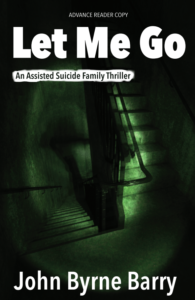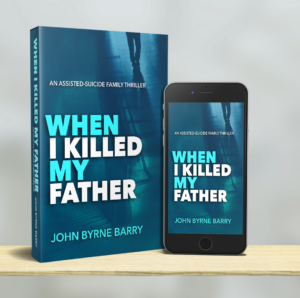A year ago, as I was finishing the first beginning-to-end draft of my third novel, When I Killed My Father: An Assisted Suicide Family Thriller, I recruited a dozen beta readers to help me make it better.
I asked for honest feedback, which I got in spades — I was pretty disheartened by how much there was. What I wanted, if I’m honest with myself, was gushing praise. There was some of that, but I paid more attention to all the criticism and suggestions.
Originally, I imagined a handful of beta readers, but the first few people I asked were busy or hadn’t had a chance to start reading, so I changed tactics and ended up asking 20 people, mostly by email.
Two said no, but were honored I asked. Two never responded. Three said yes, but didn’t follow through. One stopped after five chapters. Another read the book, or said she did, but never shared feedback with me, despite my nagging.
I am in two writing groups, so I have been getting helpful feedback since I started the book. One of the two groups is a writers’ drop-in that meets at the Mill Valley Library — we write for an hour, then take turns reading out loud and sharing feedback. I read every chapter of my book at the library, though not necessarily in order, and sometimes more than one iteration. But no one heard all the chapters. In the other writing group, we shared chapters in advance, and met once a month to talk through our feedback.
The beta readers were the first to read the book as a whole, beginning to end, and that first month or two when I started getting feedback, well, I was more anxious than excited.
My first beta readers were friends, family, and fellow writers, but there were also some almost strangers in the mix, like a woman from Pennsylvania who I talked about my book with on a bicycle tour in San Francisco, and another I met at a Hanukkah party.
I sent most readers digital files, but some preferred print, so I designed and printed five advance reader copies from KDP/Amazon. I also sent them a form with nine questions.
I also asked them to weigh in on my title choices — the novel was called Let Me Go at the time. Other options included What I Did For My Dad, At First I Said No, Cheeks as Smooth as Ice, and Edgewater, which had been my working title since the beginning.
(I was leaning toward Let Me Go, which my brother Pat suggested, but one day, I shared the title with a small group and one person argued that Let Me Go was too subtle. I said that I didn’t want to be over the top and call it Why I Killed My Father, and she blurted out, “Oh, that’s so much better.” That became my top choice, but because a number of people said it sounded like a how-to book, not a novel, I changed the first word from “why” to “when.”)

From the beginning, I imagined two rounds of beta readers. I remember telling the earliest readers that my plan was to integrate their feedback into a rewrite and have another manuscript ready in May. That turned into August, because so much of the feedback was valuable that the rewrite took longer than planned.
Let me share a plot summary, so the feedback makes sense: Psychologist Lamar Rose’s father is suffering from cancer and dementia, and wants his son to help him end his life. Lamar refuses, but his father keeps asking, and he relents. Then, from the pulpit of the church at his father’s memorial, his sister accuses him of murder, setting off a high-profile, public fight between the two siblings.
My goal was to write a “page-turner with a conscience,” and most readers said the pace was excellent — a few read it in a day or two — especially the second two-thirds of the book. But a few said it dragged at the beginning. I knew that already, that things raced along once all the balls were up in the air, but it took some time to toss them all.
My first question was “What did you like best about the story?” It was valuable (and heartening) to see what readers said, but I didn’t pay that much attention to these answers, because they didn’t require action.
Answers included:
- Lamar’s observation that his father’s lucid moments were the worst because that was when he understood he was losing his mind.
- The family relationships, particularly the dynamic between Lamar and his sister Andrea.
- The way clues to the characters’ motives and psychology were woven through the story.
- The first section, the actual euthanasia scene, was riveting.
- The night Lamar killed his father, and had to hide under the bed after he dropped the tank of nitrogen and woke his father’s roommate.
I also asked what needed improvement and the criticism that stung the most came from a reader who felt I was too distant during the most emotional scenes. She said she felt like she was seeing the scene through a window and she wanted to be in the room. Ouch!
That criticism colored my whole rewrite, and I added an important scene in the first chapter, where Lamar arrives to find his father in the bathroom, the faucet running, his face half-shaved, his eyes vacant. When he saw Lamar in the mirror, approaching from behind, he dropped the razor and it clattered on the floor. Then he cringed as if he were bracing for a beating.
Lamar turned away.
He couldn’t bear it, so how could his father?
Then, after his father went on a crazy rant, Lamar calmed him down, finished shaving him, and led him back to his bed.
More than one reader found the protagonist not likable enough — one reader said he was too insensitive and self-centered. The story jumps back eight summers earlier to when Lamar leaves his depressed wife and pursues women on the internet. Some readers encouraged me to ditch the dating scenes. Another said keep the women, but not the dating angst.
Another reader was bothered by Lamar’s preoccupation with getting laid. “In the early part, I was feeling compassion for him, but then he turned into this ridiculous adolescent preoccupied with how women look.” That hurt too, but I believe I fixed the worst of that before publication.
I corresponded with all of the beta readers one-on-one, thanking them for their feedback, sometimes asking more questions. I called readers to ask more questions, sometimes sharing feedback from other readers, and asking them if they agreed.
The likability of the characters was especially important. There’s nothing wrong with unlikable characters — no one liked the protagonists in Gone Girl, and author Gillian Flynn laughed all the way to the bank — but if they’re too odious, readers won’t want to spend time with them.
What was most useful was when many readers said the same thing. That was the case with Lamar’s sister, Andrea, who came across to many as too unsympathetic, too bitchy, too unhinged. Why was she so sure, several readers asked, that her brother had killed their father, and, perhaps more important, why did she attack him with such white-hot vengeance, calling him “smug and sanctimonious” during a TV interview?
At this point, I was committed to the story, and the scenes where Andrea accused or attacked Lamar were strong and I didn’t want to water them down. What I did do, however, was backfill more motivation for Andrea — her need for control, her feelings that her brother patronized her, her unhappiness with her own lot. Her actions didn’t change, but they became more understandable, and, I believe, she became more sympathetic. Not necessarily likable, but believable. And, spoiler alert, she lets go of her anger toward the end of the story.
I devoted more attention to her wounds, like how much she missed her mother, who she used to talk with every day. In our writing group, one common suggestion we make to each other is to go deeper. It has become a cliché, but that doesn’t mean it’s not on target. I went deeper.
What was gratifying was that pretty much everyone thought the main story — a man caught between what is compassionate and what is legal, a man whose father asked him to end his life — was both gripping and important.
I did two rounds of beta readers — the first in February, the second in August — and ended up with 25 readers who read the book and gave me feedback. Between the first round and the second, I rewrote the book and, based on the feedback I received in the second round, apparently I addressed the most pressing concerns. (Of course, they were different beta readers, so this is far from a controlled scientific experiment.)
Now that I’ve completed and published the book, and positive reviews are trickling in — as of this morning, I have 21 5-star reviews on Amazon — I can confidently say that When I Killed My Father is significantly better because of improvements that I might not have made without the feedback. In other words, the criticism was exactly what I needed, and, with the wisdom of hindsight, even wanted.
(You can read the first three chapters here.)

Great write up on your experience with us beta readers. I really felt good about being able to give you some feedback and seeing the changes you made after hearing from everyone. Your book really, really is so good and a valuable contribution to our social conscious and personal situation(s). Keep up the good writing and facing the hard work, it is worth it!
Someone asked me what questions I asked beta readers. Here are the ones that yielded the most valuable answers.
— What did you like best about the story? What was the strongest part?
— What did you like least? Where does the story need to be improved?
— Which characters engaged you the most? Why? Which did you have the hardest time imagining?
— Any places where the pace slows down too much? Where it races too fast?
Instructive and inspiring. thanks for sharing your process, John.
So valuable. It is harder and harder to get my friends to read my novels. Eye trouble, old age, whatever. I liked the idea of asking a bunch of people on the Internet. There are still great readers out there and I think my novels are good reads. I am working on my trilogy with Ruth Schwartz right now. Am hoping to get book one published soon. Maybe even book two. Hey! Book 3!! I have found that the English like my writing. Anyway, thanks John. It is a life time journey.